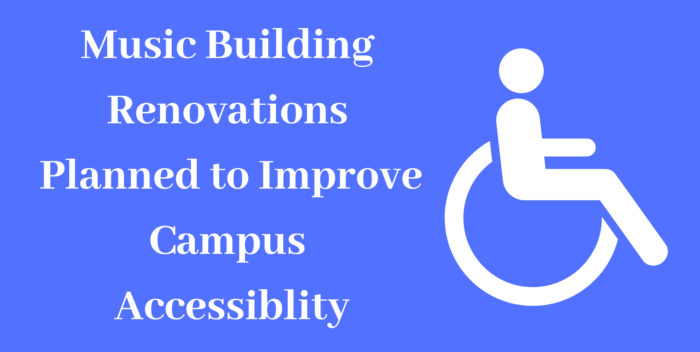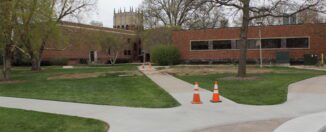Music Building Renovations Planned to Improve Campus Accessibility
by April Bayer
Concordia is planning to begin renovations on the Music Center in late April to improve the building’s accessibility for students and guests with disabilities.
The upcoming changes are a part of the university’s ongoing strategic plan to expand the campus and provide new opportunities for students. One of the plan’s goals is to make the older buildings on campus compliant with current building codes and with the guidelines laid out in the federal Americans with Disabilities Act (ADA).
Some of the planned changes to the Music Center include the addition of an elevator, ramps at the building’s entrances, larger and more accessible bathrooms, a sprinkler system to improve fire safety, new ceilings and lights, and an updated heating and cooling system. The band and choir rooms on the second floor will also be renovated, and the band room will receive acoustic treatments to make the decibel levels safer for students’ hearing.
“When you put about 20 instrumentalists in (the band room), the decibel level goes so high where it’s unsafe for a person’s hearing. When you figure we regularly put a band of 50 to 70 in that room, that just becomes unsafe for people’s hearing health,” Professor of Music Jeffrey Blersch said. “I think as a musical culture we’ve become more acutely aware of that issue in the last decade or so.”
Blersch said some of the building’s more notable features, such as the mid-century modern staircase, will be modified but preserved, while the future of other elements, such as the koi pond, remain uncertain.
All music classes will officially end on April 12 since faculty and staff are required to begin moving out of the building before Easter. Some of the instruments and equipment will be relocated while others will be moved into storage. All music classes and music professors’ offices will be relocated to other buildings across campus for the 2019-20 school year.
“It’s only temporary, and the end result will be very much worth it for (current students) and future generations of students too,” Blersch said.
ADA guidelines not only affect building accessibility but also outdoor elements of the campus, such as the inclusion of curb cuts and accessible parking spots. They also play into academic factors, such as the location and format of both physical and online courses.
Another recent change designed to improve accessibility on campus was the addition of automatic push-button doors to the lower level of the Janzow Campus Center.
“That was something we’re not required to do by law, but because we’re trying to do as much as we can to make the campus more accessible, we felt like (the doors) would be a good addition for students and also for guests on campus and anybody that would have a need as far as a mobility issue or difficulty with grasping a door to open it,” Academic Resources and Disability Support Services Coordinator Bethany Landrey said.
Landrey said the university will continue to look for any ways it can improve the campus in the future to fit students’ needs.
“Accessibility is never going to be perfect, but we’re trying to make things more accessible for everybody so that everything can be as useful as possible,” Landrey said.













